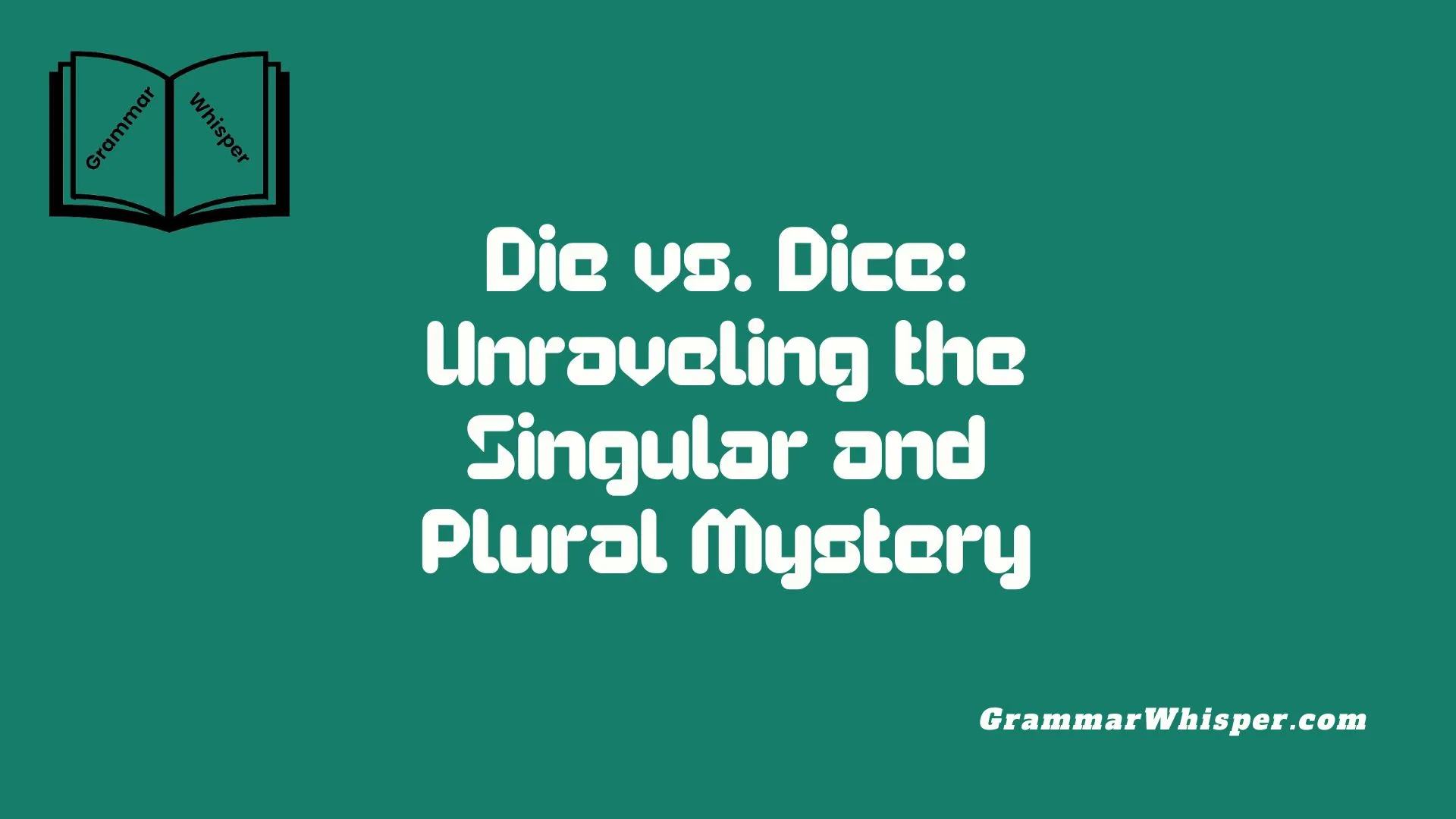The English language is full of quirks, and a prime example is the distinction between Die vs. Dice. These terms are commonly used in games and everyday conversation, but their correct usage often sparks debate. From my experience, learning about the history and evolution of these words helps clarify their place in modern English. When you delve into the current standards surrounding die and dice, you see how these words have changed over time yet still cause confusion for many.
In most conversation or casual settings, people often use dice for both singular and plural forms, but traditional grammar insists that die is singular and dice is plural. This subtle distinction in usage reflects broader changes in the English language itself. Knowing the correct way to use these terms isn’t just a matter of grammar but also shows respect for the rich history and standards surrounding them. Whether you’re chatting about games or writing formally, being aware of this can save you from common mistakes and ongoing debates.
Understanding the Core Difference Between ‘Die’ and ‘Dice’
At its core, the difference is straightforward:
- Die: Traditionally the singular form.
- Dice: Traditionally the plural form.
However, in modern usage, especially in informal contexts, “dice” is frequently used as both singular and plural. For example, one might say, “Roll the dice,” even when referring to a single cube.
Quick Comparison Table:
| Term | Traditional Usage | Modern Informal Usage | Example |
| Die | Singular | Less common | “Roll one die.” |
| Dice | Plural | Singular & Plural | “Roll the dice.” |
Etymology and Origin of ‘Die’ and ‘Dice’
The word “die” originates from the Old French word dé, which in turn comes from the Latin datum, meaning “something given or played.” Historically, “die” referred to a single gaming cube, while “dice” was its plural form.
Over time, especially in colloquial speech, “dice” began to be used for both singular and plural, leading to the current ambiguity.
Grammatical Evolution: Singular vs. Plural Rules
Traditionally, English maintained a clear distinction:
- Die: Singular
- Dice: Plural
However, language evolves. Modern dictionaries and usage guides reflect this shift:
- The Oxford English Dictionary notes that “dice” is now commonly used as both singular and plural in gaming contexts.
- Merriam-Webster acknowledges “dice” as an acceptable singular form, especially in informal settings.
Despite this, in formal writing or academic contexts, it’s advisable to maintain the traditional distinction to ensure clarity.
Modern English Usage and Acceptance in Dictionaries
Different dictionaries offer varying perspectives:
- Oxford English Dictionary: Recognizes “dice” as both singular and plural in modern usage.
- Merriam-Webster: Lists “dice” as a plural noun but notes its singular usage in informal contexts.
- Cambridge Dictionary: Maintains the traditional distinction but acknowledges the evolving usage.
This variation underscores the importance of context when choosing which term to use.
Practical Usage: How ‘Die’ and ‘Dice’ Appear in Real Life
In real-world applications:
- Board Games: Rulebooks often use “die” for singular and “dice” for plural. For example, “Roll one die to determine your move.”
- Casinos: The term “dice” is predominantly used, even when referring to a single cube.
Everyday Conversation: People commonly say, “Roll the dice,” regardless of the number of cubes involved.
Usage Table:
| Context | Preferred Term | Example |
| Board Games | Die/Dice | “Roll one die.” / “Roll two dice.” |
| Casinos | Dice | “Place your dice on the table.” |
| Casual Speech | Dice | “Let’s roll the dice.” |
Regional and Cultural Variations in Usage
Language usage can vary by region:
- United States: “Dice” is commonly used as both singular and plural in informal contexts.
- United Kingdom: There’s a stronger adherence to the traditional distinction, with “die” used for singular.
Cultural factors, such as gaming communities and educational systems, also influence usage patterns.
Common Mistakes and Misunderstandings
Misusing “die” and “dice” can lead to confusion:
- Saying “a dice” when referring to a single cube is technically incorrect in formal writing.
Using “die” as a verb meaning “to cease living” can cause ambiguity if not properly contextualized.
Common Mistakes Table:
| Incorrect Usage | Correct Usage | Explanation |
| “He rolled a dice.” | “He rolled a die.” | “Die” is the singular form. |
| “She has two die.” | “She has two dice.” | “Dice” is the plural form. |
Idioms, Metaphors, and Expressions Using ‘Die’ or ‘Dice’
These terms have permeated various expressions:
- “The die is cast”: An irreversible decision has been made.
- “Roll the dice”: To take a risk.
- “No dice”: An informal way of saying “no” or indicating refusal.
Such idioms highlight the cultural significance of these terms beyond their literal meanings.
Expert Opinions and Case Studies
Linguists and language experts have weighed in:
- Grammarist notes the shift in usage, emphasizing the importance of context.
- Grammarly acknowledges the evolving nature of language, suggesting flexibility in informal settings.
Case studies in educational materials and gaming manuals reveal a trend toward using “dice” as both singular and plural, reflecting real-world usage patterns.
SEO Comparison: How People Search for ‘Die vs. Dice’
Online search trends indicate:
- A significant number of queries about the correct usage of “die” and “dice”.
- Common questions include:
- “Is dice singular or plural?”
- “What is the singular of dice?”
This suggests a widespread curiosity and confusion, emphasizing the need for clear guidance.
Final Guidelines for Correct Usage in Your Writing
To ensure clarity:
- Use “die” when referring to a single cube in formal writing.
- Use “dice” for multiple cubes or in informal contexts.
- Consider your audience and the context to determine the most appropriate term.
Quick Reference Table:
| Number of Cubes | Formal Writing | Informal Writing |
| One | Die | Dice |
| Two or more | Dice | Dice |
Summary Table: ‘Die’ vs. ‘Dice’ at a Glance
| Term | Function | Number | Common Contexts | Example Sentence |
| Die | Noun | Singular | Board games, formal writing | “Roll one die.” |
| Dice | Noun | Plural/Singular | Casinos, informal speech | “Roll the dice.” |
Final Thoughts
Language is dynamic, reflecting cultural shifts and usage patterns. While traditional rules provide a foundation, real-world usage often dictates acceptability. By understanding the history and current standards of “die” and “dice”, we can communicate more effectively and appreciate the richness of the English language.
FAQs
What is the correct singular form of “dice”?
The correct singular form of “dice” is “die”. In formal writing and traditional grammar, you should say “roll one die.” However, in casual conversation, many people still say “a dice,” even though it’s technically incorrect.
Can “dice” be used as singular?
Yes, “dice” is commonly used as both singular and plural in informal settings. Many dictionaries now recognize this usage. However, in formal or academic writing, it’s still better to use “die” as the singular form to maintain clarity and correctness.
Why is there confusion between “die” and “dice”?
The confusion exists because “dice” is used so often in casual speech that it has gradually replaced “die” in everyday conversation. Since both words are connected to the same object and “die” also means “to stop living,” it’s easy to mix them up without context.
How should I write “die” or “dice” in a game instruction?
In professional game instructions or manuals, always use the traditional terms for clarity: “die” for a single cube and “dice” for two or more. For example: “Each player rolls one die to begin.”
Are “die” and “dice” used differently in the UK and US?
Yes. In the UK, there’s a stronger tendency to stick with the traditional “die” and “dice” distinction. In the US, it’s more common to hear “dice” used as both singular and plural, especially in casual or spoken language.











